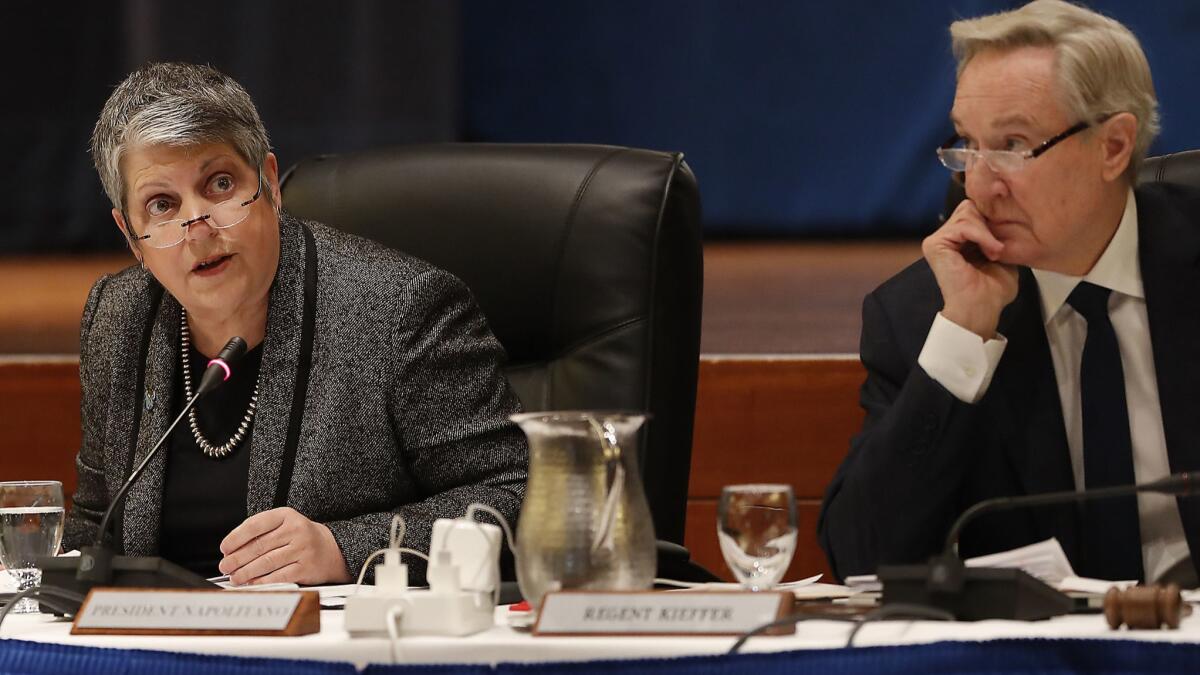UC regents approve leaner budget for Janet Napolitano

- Share via
Reporting from San Francisco — University of California regents on Thursday unanimously approved a leaner, more transparent budget for President Janet Napolitano, moving to address political criticism over the system’s central office operations.
The $876.4-million budget for 2018-19 reflects spending cuts of 2%, including reductions in staffing, travel and such systemwide programs as public service law fellowships, carbon neutrality and food security.
Napolitano shifted $30 million to campuses for housing needs and $10 million to UC Riverside to support its five-year-old medical school. She also permanently redirected $8.5 million annually to help enroll more California students, as required by the state.
The spending plan incorporates changes recommended by a recent state audit, which found several financial problems in previous budgets, including a $175-million unreported reserve. UC officials said the money had been allocated to university programs but was not clearly reported. The new budget specifies all sources and uses of funds.
Napolitano told regents at their San Francisco meeting that the UC budget was more complex than any she had ever seen, including those she handled as Arizona governor and U.S. Homeland Security secretary.
The budget has 466 different funds with varying restrictions on their use. Two-thirds of the total revenue is fees for assistance — such as investment and legal services — that the central office gives campuses, or money that passes through the president’s office en route to others, such as state dollars for tobacco disease research.
“Our goal was to clarify and simplify the financial operations of the Office of the President, and to make them more transparent,” Napolitano told regents. “And I believe we’ve made great progress.”
In a lively discussion, regents asked a range of questions about the budget reserve, the fees for services, the use of campus housing money and the rising costs for the new systemwide information technology system, UCPath, as it goes online at more campuses.
Board Chairman George Kieffer called the new budget presentation “a remarkable turnaround” as he and other regents praised the staff for their thousands of hours of work on it.
“This is a breath of fresh air,” said Lt. Gov. Gavin Newsom, an ex-officio regent who is running for governor. “This is exactly the kind of engagement and transparency we need.”
Regent Eloy Ortiz Oakley said the more transparent document would put to rest ideas that the president’s office was hiding money.
“This goes a long way in addressing the false notion that there was a slush fund,” he said.
Regents also discussed UC’s financial aid program, which, combined with state grants, amounts to one of the most generous in the nation. About 56% of undergraduates receive grants, and an additional 8% receive state middle-class scholarships.
Tuition and fees are waived for those whose families earn less than $80,000, though some regents noted that even those students struggle under California’s high cost of living.
“We leave the impression that we’re covering the needs of all students who are low-income, and that’s simply not true,” Ortiz Oakley said.
In other matters, regents voted to make it slightly easier to qualify for in-state tuition by shortening the time, from two years to one, that students under age 24 are required to show they are financially independent from parents who live outside California. They are still required to live continuously in California for more than a year and prove their intent to make the state their permanent home.
Students who qualify as Californians will save nearly $120,000 in nonresident tuition over four years. UC staff could not say how many students might be affected by the change.
Twitter: @teresawatanabe
UPDATES:
May 25, 8:25 a.m.: This article was updated to clarify the details of a new rule that allows students to qualify for in-state tuition more easily.
This article was originally published at 6 p.m. May 24.
More to Read
Sign up for Essential California
The most important California stories and recommendations in your inbox every morning.
You may occasionally receive promotional content from the Los Angeles Times.











